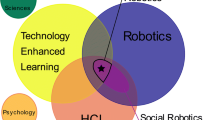Abstract
During the last decade, there has been an increased interest in research on the use of social robots in education, both in typical education as well as in special education. Despite the demonstrated advantages of robot-assisted tutoring in typical education and the extensive work on robots in supporting autism therapy-related scenarios, little work has been published on how social robots may support children with Learning Disabilities (LD). The purpose of this paper is to present a comprehensive experimental protocol where a social robot is directly involved in specially designed intervention strategies, which are currently underway. These strategies are designed to address reading comprehension and other learning skills through child-robot interaction, aiming at improving the academic performance of the children diagnosed with learning disabilities.
Access this chapter
Tax calculation will be finalised at checkout
Purchases are for personal use only
Similar content being viewed by others
References
Belpaeme, T., Kennedy, J., Ramachandran, A., Scassellati, B., Tanaka, F.: Social robots for education: a review. Sci. Robot. 3 (2018). https://doi.org/10.1126/scirobotics.aat5954
Ivanov, S.: Will robots substitute teachers? In: 12th International Conference “Modern Science, Business and Education”, Varna, Bulgaria, pp. 42–47 (2016). https://doi.org/10.1080/15388220903185605
Kaburlasos, V.G., Vrochidou, E.: Social robots for pedagogical rehabilitation: trends and novel modeling principles. In: Dimitrova, M., Wagatsuma, H. (eds.) Cyber-Physical Systems for Social Applications. Advances in Systems Analysis, Software Engineering, and High Performance Computing (ASASEHPC), pp. 1–21. IGI Global, Hershey (2019). https://doi.org/10.4018/978-1-5225-7879-6.ch001
Baker, L., Brown, A.L.: Metacognitive skills and reading. In: Pearson, P.D. (ed.) Handbook of Research in Reading, pp. 353–395. Longman, New York (1984)
Matarić, M.: Socially assistive robotics. In: Proceedings of the 2014 ACM/IEEE international conference on Human-robot interaction - HRI 2014, p. 333. ACM Press, New York (2014). https://doi.org/10.1145/2559636.2560043
Jacq, A., Lemaignan, S., Garcia, F., Dillenbourg, P., Paiva, A.: Building successful long child-robot interactions in a learning context. In: 2016 11th ACM/IEEE International Conference on Human-Robot Interaction (HRI), pp. 239–246. IEEE (2016). https://doi.org/10.1109/HRI.2016.7451758
Barco, A., Albo-Canals, J., Garriga, C.: Engagement based on a customization of an iPod-LEGO robot for a long-term interaction for an educational purpose. In: Proceedings of the 2014 ACM/IEEE International Conference on Human-Robot Interaction - HRI 2014, pp. 124–125. ACM Press, New York (2014). https://doi.org/10.1145/2559636.2563697
Aslam, S., Shopland, N., Standen, P.J., Burton, A., Brown, D.: A comparison of humanoid and non humanoid robots in supporting the learning of pupils with severe intellectual disabilities. In: Proceedings of the 2016 International Conference on Interactive Technologies and Games EduRob Conjunction with iTAG 2016, iTAG 2016, pp. 7–12 (2016). https://doi.org/10.1109/iTAG.2016.9
Li, J.: The benefit of being physically present: a survey of experimental works comparing copresent robots, telepresent robots and virtual agents. Int. J. Hum. Comput. Stud. 77, 23–37 (2015). https://doi.org/10.1016/j.ijhcs.2015.01.001
Leyzberg, D., Spaulding, S., Scassellati, B.: Personalizing robot tutors to individuals’ learning differences. In: Proceedings of the 2014 ACM/IEEE International Conference on Human-Robot Interaction, pp. 423–430. ACM, New York (2014). https://doi.org/10.1145/2559636.2559671
Jones, A., Castellano, G.: Adaptive robotic tutors that support self-regulated learning: a longer-term investigation with primary school children. Int. J. Soc. Robot. 10(3), 357–370 (2018). https://doi.org/10.1007/s12369-017-0458-z
Ramachandran, A., Huang, C.-M., Gartland, E., Scassellati, B.: Thinking aloud with a tutoring robot to enhance learning. In: Proceedings of the 2018 ACM/IEEE International Conference on Human-Robot Interaction - HRI 2018, pp. 59–68. ACM Press, New York (2018). https://doi.org/10.1145/3171221.3171250
Sweet, A.P., Snow, C.E.: Rethinking Reading Comprehension. Guilford Publications, New York (2003)
Vellutino, F.R.: Individual differences as sources of variability in reading comprehension in elementary school children. In: Sweet, A.P., Snow, C.E. (eds.) Rethinking Reading Comprehension, pp. 51–81. Guilford Publications, New York (2003)
Paris, S.G.: Children’s Reading Comprehension and Assessment. Routledge, Milton Park (2005). https://doi.org/10.4324/9781410612762
Nicholson, T.: Reading comprehension processes. In: Thompson, B.G., Nicholson, T. (eds.) Learning to Read: Beyond Phonics and Whole Language, pp. 127–149. Teachers College Press, New York (1998)
Gersten, R., Fuchs, L.S., Williams, J.P., Baker, S.: Teaching reading comprehension strategies to students with learning disabilities: a review of research. Rev. Educ. Res. (2007). https://doi.org/10.3102/00346543071002279
Vaughn, S., et al.: Response to intervention for middle school students with reading difficulties: effects of a primary and secondary intervention. School Psych. Rev. 39, 3–21 (2010)
Lytridis, C., et al.: Distance special education delivery by social robots. Electronics 9, 1034 (2020). https://doi.org/10.3390/electronics9061034
Papakostas, G.A., Strolis, A.K., Panagiotopoulos, F., Aitsidis, C.: Social robot selection: a case study in education. In: 2018 26th International Conference on Software, Telecommunications and Computer Networks (SoftCOM), Split, Croatia, pp. 1–4. IEEE (2018). https://doi.org/10.23919/SOFTCOM.2018.8555844
Baxter, P., Ashurst, E., Read, R., Kennedy, J., Belpaeme, T.: Robot education peers in a situated primary school study: Personalisation promotes child learning. PLoS ONE 12, e0178126 (2017). https://doi.org/10.1371/journal.pone.0178126
Acknowledgment
This research has been co‐financed by the European Union and Greek national funds through the Operational Program Competitiveness, Entrepreneurship and Innovation, under the call RESEARCH – CREATE – INNOVATE (project code: T1EDK-00929).
Author information
Authors and Affiliations
Corresponding author
Editor information
Editors and Affiliations
Rights and permissions
Copyright information
© 2022 The Author(s), under exclusive license to Springer Nature Switzerland AG
About this paper
Cite this paper
Karageorgiou, E. et al. (2022). Development of Educational Scenarios for Child-Robot Interaction: The Case of Learning Disabilities. In: Merdan, M., Lepuschitz, W., Koppensteiner, G., Balogh, R., Obdržálek, D. (eds) Robotics in Education. RiE 2021. Advances in Intelligent Systems and Computing, vol 1359. Springer, Cham. https://doi.org/10.1007/978-3-030-82544-7_3
Download citation
DOI: https://doi.org/10.1007/978-3-030-82544-7_3
Published:
Publisher Name: Springer, Cham
Print ISBN: 978-3-030-82543-0
Online ISBN: 978-3-030-82544-7
eBook Packages: Intelligent Technologies and RoboticsIntelligent Technologies and Robotics (R0)




